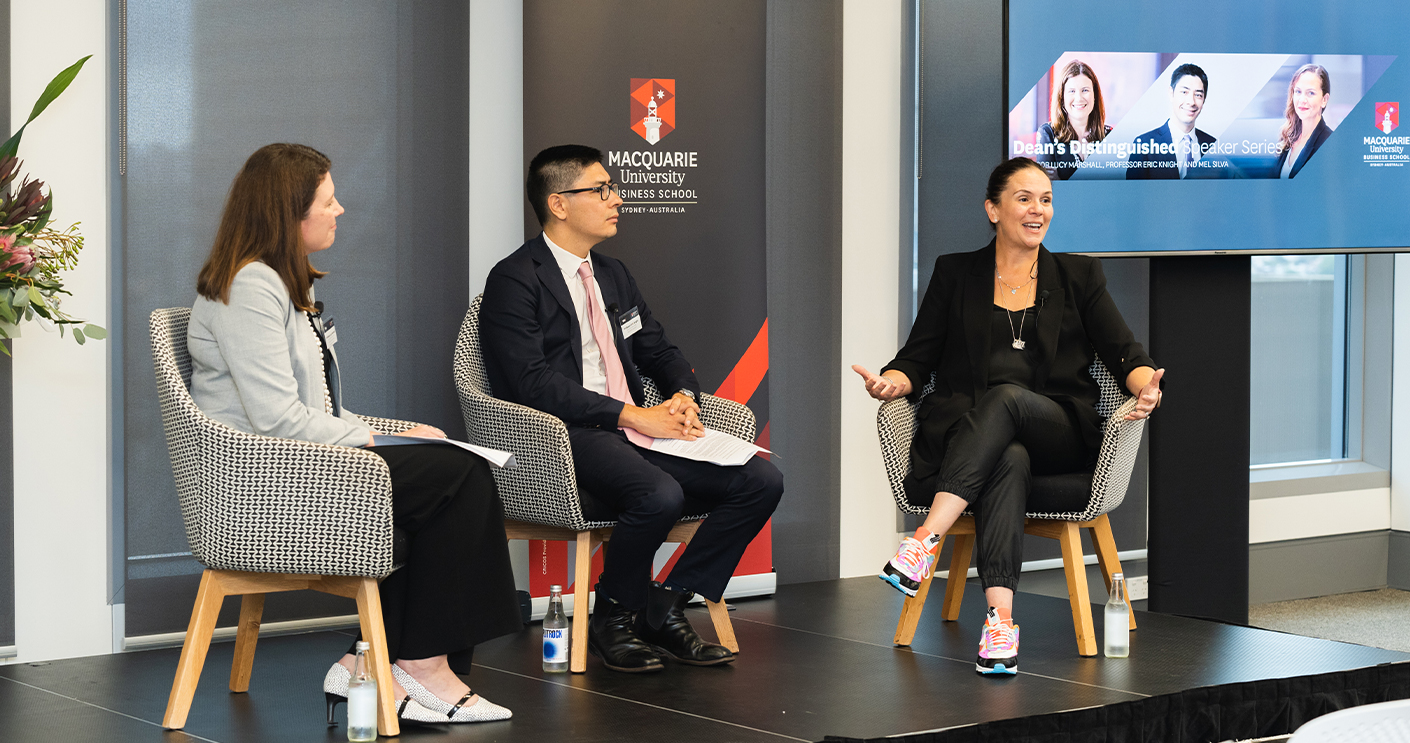Pictured L to R: Professor Lucy Marshall, Executive Dean of the Faculty of Science and Engineering; Professor Eric Knight, Executive Dean of Macquarie Business School; Mel Silva, Managing Director of Google Australia and New Zealand
Speed and convenience, increased collaboration and endless possibilities – that is the future of knowledge creation, according to Mel Silva, Managing Director of Google Australia and New Zealand. But with artificial intelligence an increasing presence in our lives, we also need to balance boldness with a sense of responsibility.
Speaking to a packed room at Macquarie University’s City Campus as part of the Dean’s Distinguished Speakers Series, Silva shared insights from Google to explain her views on how artificial intelligence (AI) interacts with knowledge creation to drive increased collaboration and convenience.
“A lot of you have been using artificial intelligence in your Google products for many years, although you may not know it,” Silva explained. “When your calendar tells you it’s time to leave because of traffic, that’s AI. When you open Google and start typing and it finishes your sentence, that’s AI. When you use the smart reply at the bottom of your email, that’s AI. Even the captions on your YouTube video are AI.”
Silva highlighted the importance of open-source approaches to AI and the need for ethical responsibility frameworks as the next step in its development and application.
“We have invested heavily in the research of AI for many years. As part of that research, you realise that there is an enormous ethical responsibility that comes with that knowledge.
“In about 2018, we came out with AI principles about how we will use the technology we create and how we are going to put some guardrails around it. I would define Google’s strategy around AI as ‘boldness underpinned with a sense of responsibility’, because when you are putting a product in the hands of billions of people, not all of them are good. We see this in bank scams, emails, texts and in people coming and knocking on your door.”
Silva also shared the story of her career pathway, from an economics degree at Macquarie Business School to becoming the head of the Australian division of one of the biggest technology companies in the world.
“When I walked into Macquarie University, I couldn’t have even dreamed of the job that I have now. The internet was something that existed on one computer in the library, and it was only two or three years into my journey that I got my first dial-up modem at home,” she recalled.
“I was always fascinated by the banking and finance services industry, and for most of my degree I was actually working part-time while studying. I had various roles and did so many things, and I think that is the hallmark of my career – I never really said ‘no’ to an opportunity that came across my desk.”
A pivotal moment in Silva’s early career came while working at AMP, during her university days. “I overheard a team talking about a project that they were working on called the ‘unified web strategy’. This would have been about 1999 when they were working on AMP’s first website. I was just like a meerkat; my head popped out of my little cubicle and I said, ‘I’ll help’.”
Silva explained that it wasn’t the formal start to a lifelong career that most people imagine, but within a year or two greater responsibilities came across her desk, and Silva was asked to lead complex and exciting projects as an internet expert. It wasn’t all smooth sailing, however, and it took time and agility to navigate the various roles that would ultimately lead her to Google.
To the students and alumni in the room, and industry partners looking for inspiration, this provided a unique and refreshing insight into how success can come from being curious and eager for new opportunities.
Silva closed her conversation with Professor Eric Knight, Executive Dean of Macquarie Business School, and Professor Lucy Marshall, Executive Dean of the Faculty of Science and Engineering, by providing some advice. The recipe for success, she explained, is “being authentic, being really open and willing to collaborate with people, and being inclusive.”


 Back to homepage
Back to homepage